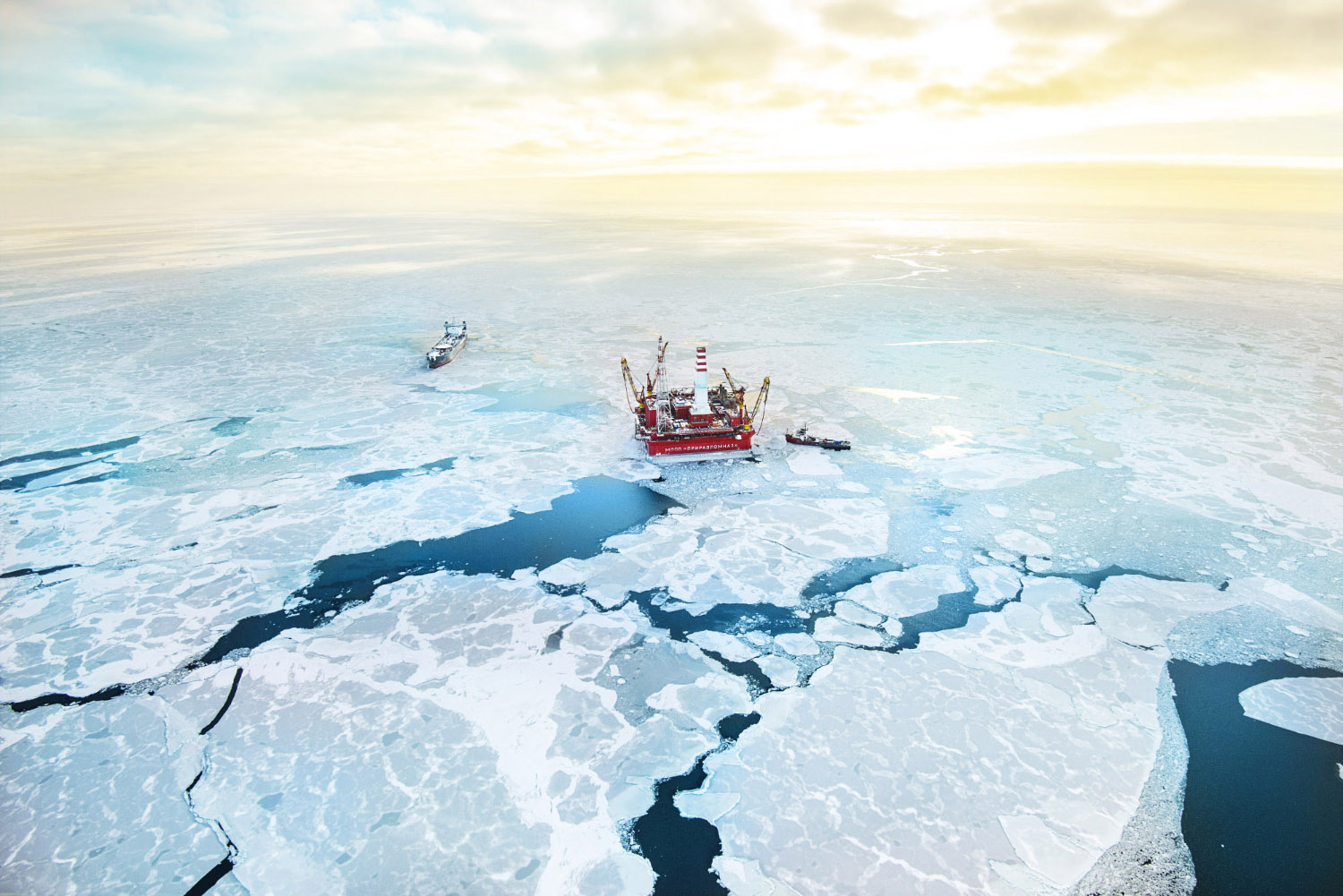
A new report warns the Nordic countries of threats and challenges to the multilateral, rules-based world order coming from climate change, cyber attacks and geopolitical developments. The report is written by Mr. Björn Bjarnason of Iceland and deals with how to further develop Nordic cooperation on foreign and security policy, On 6 July 2020 it was given to the foreign ministries of Denmark, Finland, Iceland, Norway and Sweden who will discuss the report at an upcoming meeting.
Climate change is a major concern as it giving rise to new security threats to the Nordic countries, the report explains.
“Climate change, coupled with growing tensions in international relations over the last decade, has led to big power rivalry in the Arctic between the United States, Russia, and China.”
“Amidst these drastic changes to the Arctic climate and environment, China is emerging as a global power and has defined itself as a “near-Arctic state”. The overall Chinese strategic interests are access to Arctic resources and sea routes as well as increased influence on Arctic issues. China is increasing its bilateral cooperation with the Arctic states through active economic, social, and scientific engagement in the region, including polar research.”
“China’s presence and strategic interest in the Arctic will have security policy implications. So far, Chinese military activity in the Arctic has been very limited. However, the Chinese military has now begun to strengthen its knowledge of the Arctic.
“Since 1999, the Chinese have conducted numerous Arctic expeditions. They built their first research base, the Yellow River Station, on Svalbard Island in 2004. China has officially included the Arctic sea routes in its 2017 grand development strategy, the Belt & Road Initiative (BRI). China re-emphasised this in its 2018 white paper on “China’s Arctic Policy”, outlining its interests as a major stakeholder in the Arctic. In 2018, China and Iceland jointly inaugurated the Arctic Science Observatory in northern Iceland, originally intended for observations of the northern lights. Later its research scope expanded. Plans have been presented for opening a Chinese research station in Greenland as well as a satellite receiver station.”
“All Arctic states agree that the UN Law of the Sea (UNCLOS) is the legal framework within which states should solve legal disputes regarding ocean governance. In the South China Sea, China makes maritime claims which contradict UNCLOS, although ratified by China. Such actions must be kept out of the Arctic.”
The report proposes that the Nordic countries develop a common Nordic analysis, policy and approach to Chinese Arctic involvement and pursue it within relevant regional networks to which they are all parties, i.e., within the Arctic Council, Council of Europe, Council of the Baltic Sea States (CBSS), Barents Euro-Arctic Cooperation (BEAC) and Northern Dimension.
Ten years ago, a similar report drafted by Mr Thorvald Stoltenberg of Norway gave a range of recommendations which have mostly already been implemented.
The following are more excerpts from the Bjarnason report regarding the geopolitcal security situation that the Nordic countries are facing:
“The emergence of China as a major economic, political and military actor in international affairs and its claim for special status as a “Near-Arctic State” as well as the illegal Russian annexation of Crimea in 2014 are defining factors when describing and debating the Nordic security environment since the Stoltenberg Report and the establishment of NORDEFCO in 2009.”
“The effects of climate change, including the opening up of shipping routes north of Russia and increased access to natural resources, add to the complexity of the situation. Russia is, however, dealing with the same problems as the Soviets during the Cold War, i.e., having no means to compete with the West. They are also under heavy strain due to economic sanctions. To get as much as possible in the shortest possible time, they have therefore turned to China for financing and trade in oil and gas.”
“US officials widely state worries about Chinese and Russian intent in the Arctic. For instance, Kenneth J. Braithwaite, who served as US ambassador to Norway until he was sworn in as Secretary of the Navy on 29 May 2020, said on that occasion: “The Chinese and Russians are everywhere, especially the Chinese. You would be alarmed at the amount of Chinese activity off the coast of Norway.” Statesmen and officials in the Nordic region do not seem to entirely share these worries even though there is understanding of the US position.”
“In August 2019, a total of 30 Russian naval vessels took part in what Norwegian top military leaders called “a very complex operation.” An exercise to block NATO’s access to the Baltic Sea, North Sea and Norwegian Sea, thereby closing off the Scandinavian Peninsula.”

Going beyond military threats, the report deals also with cyber issues and hybrid attacks.
“Hybrid threats, including cyber-attacks and disinformation/influence operations, pose a serious and increasing challenge to the Nordic countries. By taking advantage of the vulnerabilities of democratic and open societies, hybrid threat actors undermine Nordic security, prosperity, and values. Hybrid threats are ambiguous and designed to allow deniability. Therefore, it is difficult, but even more important, to address them.”
“The importance of multilateral cooperation of like-minded states in fighting cyber and hybrid threats is undisputed. All Nordic countries recognize the importance of The European Centre of Excellence for Countering Hybrid Threats (Hybrid CoE) in Helsinki, which supports participating states’ individual and collective efforts to enhance their capabilities, resilience, and preparedness to counter hybrid threats.”
“Strong arguments have pointed out that one should actually not talk about “hybrid threats” but rather “hybrid warfare” as at least some Nordic countries are under constant attack.”
“Hybrid warfare happens in the real and the virtual world. The real-world’s segment is in principle well observed and understood, while the virtual segment operates stealthily in the invisible world of computers and networks until it shows effects in the real world.”
“State and non-state actors deploy hybrid means to challenge countries and institutions that they see as a threats, opponents or competitors to their interests and goals. The range of methods and activities is wide, including: espionage; influencing information; meddling in elections; intellectual property theft; exploiting logistical weaknesses like energy supply pipelines; economic and trade-related blackmail; undermining international institutions by rendering rules ineffective; terrorism or increasing the sense of insecurity; threatening civilian air traffic, maritime communications, energy cables and causing maritime incidents.”
“The Nordic countries should join hands in condemning those conducting hybrid warfare where part of the game is to deny any culpability.”
“The two state actors most often mentioned as posing a threat to the Nordics in this regard are Russia and China. These states have developed effective subversive means that go much further in weakening their targets than fake news and disinformation do. Such means have been used before to prepare the ground for illegal annexation, as seen in the Crimea in the spring of 2014. That event represented a swift culmination of prolonged Russian efforts to destabilise Ukraine. Russia’s denial of any responsibility characterised the aftermath. Apart from the illegal incursion in the South China Sea, China conducts lower key hybrid operations than Russia. Social engineering and economic espionage are Chinese trademarks having social, economic, and financial aims, mirrored in their efforts to gain access through strategic investments and research projects.”
“As all countermeasures are sensitive and can lead to reprisals, the multinational aspect of hybrid and cyber defensive measures make a crucial difference. It would be of great value if the Nordics developed common Nordic situational awareness.”
“The total defence concept is highly relevant in hybrid defence as it covers both civilian and military security. The defence sector depends on civilian digital infrastructures and services. Hybrid security challenges in the civilian sector therefore also affect the military sector. In worst case scenarios, hybrid attacks on, for example, civilian infrastructure may challenge a state‘s ability to safeguard national security.”
As an example, the report mentions:
“Due to COVID-19, the demand for health and genetic data based on tests has skyrocketed globally. This could be categorized as a hybrid threat when companies, often state-connected, compile biometric data, such as DNA samples, from individuals all over the globe. In this regard, attention has been drawn to BGI (formerly the Beijing Genomics Institute), a leading Chinese gene sequencing and biomedical firm, which has distributed more than 10 million COVID-19 tests to over 80 countries worldwide.”
The report says, that it is the role of data protection agencies and total or civil defence institutions to analyse and take measures against threats of this kind.
On threats to the rules-based world order, the report says:
“The Nordic countries are deeply concerned by the diminishing trust in multilateralism when it is most needed to solve complex and transboundary global challenges. They, like other smaller countries, rely heavily on respect for and the functioning of the rules-based international system. Its disruption also undermines the core principles that the Nordics share, such as democracy, the rule of law, and human rights. Free international trade and travel are basic features of modern liberal democracies.”
“The liberal world order [after 1945. Ed.] was never truly global, but the United States had the strength, authority and will to sustain it. The shifting global power balances raise question marks about the future of this order. The US is more inward looking than ever since the end of World War II and is increasingly withdrawing from multilateral fora. The United Kingdom, a key partner for the Nordics in the field of foreign and security policy, is taking a new international course with Brexit. In the European Union, a fundamental discussion on the core values of liberal democracies is taking place. Within the Council of Europe, Russia’s membership has been called into question due to its disregard of basic human rights. And contrary to what so many had hoped, China retains a different mind-set than liberal democracies.”
“For the Nordics, having been committed to the established rules-based world order for the last seven decades, the situation today is a great challenge. The proposals mainly aim at finding and utilizing the best tools available to promote Nordic core values worldwide in a modern and peaceful manner.”
“Overall, the Nordic countries are faced with a new, fluid, and challenging security landscape characterized by unpredictability, volatility, and great power competition. This altered strategic environment means that the Nordics need to constantly review their common international position and role in securing an enduring, prosperous, and peaceful existence for their citizens. Doing this will require them to secure a meaningful role in the strife for multilateralism and the rules-based world order, in tackling the challenges of climate change and in effectively addressing hybrid and cyber threats, both of which are being employed by states and non-state actors to undermine the multilateral system and the rules-based world order. In a geopolitical context, it is of utmost importance for all the Nordic countries to keep NATO and the EU interested in their security concerns.”
The report is available for download here: NORDIC_FOREIGN_SECURITY_POLICY_2020_FINAL
